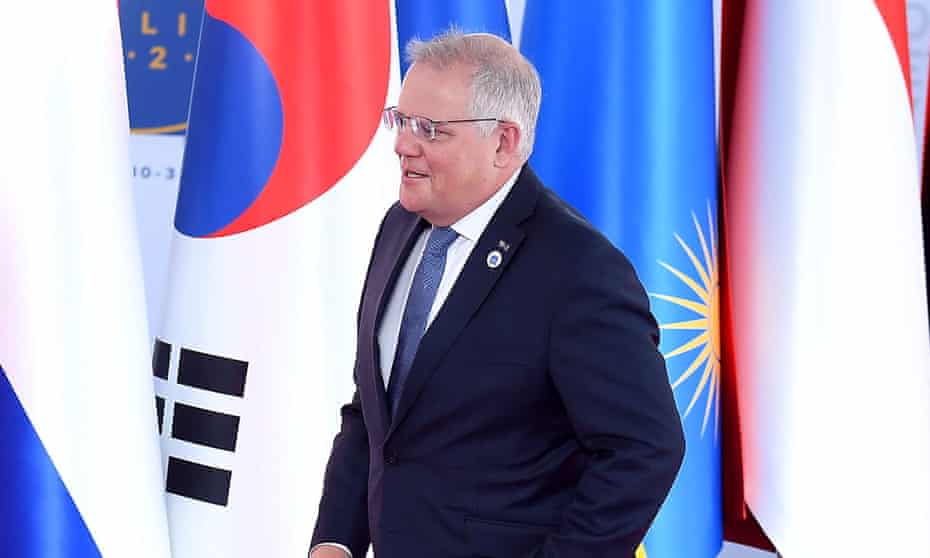Scott Morrison uses final G20 remarks to defend climate policy ahead of Cop26
PM says Australia has cut emissions by ‘more than most of the countries sitting around this table’

Scott Morrison has used his final remarks at the G20 summit in Rome to declare climate finance must focus on adaptation and “empowerment”, not just on emissions reduction.
As the G20 summit in Rome wound up with a communique that did not include a firm commitment to achieve net zero carbon emissions by 2050, and had only a vague commitment to “phasing out investment in new unabated coal power-generation capacity … as soon as possible”, Australia’s prime minister pushed back at coordinated global efforts to phase out fossil fuels.
Morrison flies to Glasgow on Sunday night after two days in Rome to attend the United Nations-led Cop26 climate conference, where countries will deliberate on a new goal for international climate finance after 2025, including a role for private finance.
In his final remarks at the G20, Morrison defended his government’s climate policies in the face of sustained domestic and international criticism.
While several G20 countries including the US and UK have pushed Australia to step up its ambition in the present decade, Morrison told his peers: “Australia has already reduced its emissions by more than 20% on 2005 levels, which is more than most of the countries sitting around this table.”
He called for a shift in thinking around climate finance. The existing Green Climate Fund (GCF) was set up through the UN’s climate convention to help developing countries adapt to the impacts of climate change and cut their own greenhouse gas emissions.
Morrison pulled Australia out of the fund in 2018 during an interview with radio broadcaster Alan Jones. Subsequently Australia has funded projects in the Pacific region, and in the lead-up to Glasgow the Morrison government has flagged more bilateral agreements to pursue emerging technologies, and an effort to set up a new framework in the Indo-Pacific for carbon offsets.
In his remarks on Sunday, Morrison acknowledged that funding should go to emissions reduction but said it should also go to projects helping countries adapt to deal with the impacts of global heating. Funding should give the developing world agency, he said.
The prime minister said the answer to the climate crisis was not compensation for developing countries, “or taxing them with border tariffs, or having them settle for less, but focusing on the scientific, technological and engineering solutions that can transform their economies and enable them to succeed, as the developed world has.”
Morrison said international climate agreements should accept the process of transition rather than seek “abolition” – which is a reference to moves by several developed economies to curb methane emissions and accelerate the phasing out of fossil fuels, in line with what climate science says is necessary to avert runaway global heating.
He said Australia was investing heavily in the development of new technologies “to achieve the goals that our own modelling shows will move the dial and make a net zero economy achievable – not just in Australia, but in India, Indonesia, Vietnam, Brazil and South Africa.”
Morrison said a developing world-centred approach carried “disfranchisement risks”. International climate agreements have never focused exclusively on the developing world, but instead have been framed around a principle of common but differentiated responsibilities, meaning rich countries do more because they can afford to. Morrison said any solution “that is geared only to developed countries does not solve climate change”.
He told his G20 peers that Australian investments in technology are focused on storage, sequestration, industrial processes and climate adaptation. He said many of the technologies existed now, but he acknowledged that some of the methods preferred by Australia in its net zero strategy were not yet in existence, “just like a Covid vaccine didn’t exist two years ago”.
While experts say the transition to carbon neutrality requires not only technological solutions to lower emissions but also clear targets, policies and mechanisms that allow price signals facilitating efficient investment during the transition, Morrison will declare in Rome that “technology at cost and scale is the answer”.
“Australia intends to play a major role in this and the supply chains that are needed to drive the new energy economy, and we want to partner with others who want to achieve the same,” Morrison said.
A number of G20 countries had hoped the Rome summit would produce a communique on climate action paving the way for a successful Cop in Glasgow. But a number of countries, including Australia, resisted firm pledges to phase out coal.
The draft communique committed nations to “phase out and rationalise” fossil fuel subsidies by 2025 and curb coal power. But the landing point was less than hoped.
Morrison signalled on his arrival in Rome that Australia would have a significant problem with communique language hastening the demise of the coal industry. China and India were also among the countries opposed to specific commitments.
While the government’s political mantra for its climate policies is “technology not taxes”, its preferred approach to managing the transition is bankrolled by significant taxpayer-funded expenditure.
On Sunday the minister for energy and emissions reduction, Angus Taylor, acknowledged that the Coalition’s “technology not taxes” plan for net zero emissions by 2050 could cost taxpayers much more than the $20bn already allocated.
